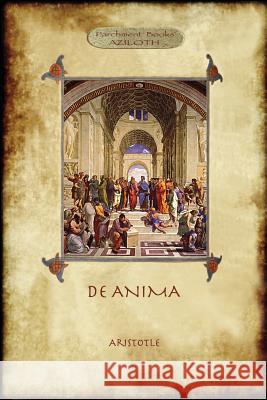De Anima: R.D. Hicks' original full translation & introduction (Aziloth Books) » książka
De Anima: R.D. Hicks' original full translation & introduction (Aziloth Books)
ISBN-13: 9781909735958 / Angielski / Miękka / 2016 / 122 str.
Aristotle of Stagira was arguably the most famous of all Greek Philosophers. A pupil of Plato's Academy, he set up his own school and, unlike Plato, he emphasized natural philosophy, studying the heavens (he believed the earth to be spherical) and making meticulous dissections of many animals, by which he constructed a surprisingly modern system of classification. A true polymath, Aristotle's oeuvre comprises 150 volumes of work on a host of subjects, from politics to poetry, through ethics, theatre, music, biology and logic to physics and metaphysics. In 'De Anima', Aristotle focuses his extraordinary intellect upon the very centre of our being. What, he asks, is the Soul? How does it come to be? What is its nature and attributes? Is it immortal? Using logic and close reasoning, he constructs a comprehensive account of the soul's facets and functions, describing the manner in which the many physical attributes of corporeal existence are mediated by the intangible, elusive soul. R. D. Hicks was a classicist and Fellow of Trinity College, Cambridge University. His original translation covers all three books of 'De Anima' and is preceded by a 40-page introduction, giving the reader a clear perspective on Greek thought in Aristotle's time. A must for all those interested in Greek Classics and the development of Western Philosophy.
Aristotle of Stagira was arguably the most famous of all Greek Philosophers. A pupil of Plato's Academy, he set up his own school and, unlike Plato, he emphasized natural philosophy, studying the heavens (he believed the earth to be spherical) and making meticulous dissections of many animals, by which he constructed a surprisingly modern system of classification. A true polymath, Aristotle's oeuvre comprises 150 volumes of work on a host of subjects, from politics to poetry, through ethics, theatre, music, biology and logic to physics and metaphysics. In 'De Anima', Aristotle focuses his extraordinary intellect upon the very centre of our being. What, he asks, is the Soul? How does it come to be? What is its nature and attributes? Is it immortal? Using logic and close reasoning, he constructs a comprehensive account of the soul's facets and functions, describing the manner in which the many physical attributes of corporeal existence are mediated by the intangible, elusive soul. R. D. Hicks was a classicist and Fellow of Trinity College, Cambridge University. His original translation covers all three books of 'De Anima' and is preceded by a 40-page introduction, giving the reader a clear perspective on Greek thought in Aristotle's time. A must for all those interested in Greek Classics and the development of Western Philosophy.











